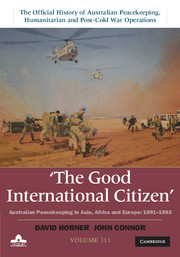Book contents
- Frontmatter
- Contents
- Maps
- Preface
- Chronology 1989–99
- Abbreviations
- Part 1 Strategy and policy
- Part 2 Cambodia
- 3 From Angkor Wat to Pol Pot
- 4 Law and order on the border
- 5 An Australian peace proposal
- 6 First into Phnom Penh
- 7 The roadblock
- 8 Change in plan
- 9 ‘Democracy's surprise triumph’
- 10 Developing Operation Banner
- 11 Winding up Operation Banner
- Part 3 Western Sahara
- Part 4 Former Yugoslavia
- Part 5 Watch on Iraq
- Appendix A United Nations Security Council resolutions
- Appendix B Major office bearers, 1991–99
- Bibliography
- Index
- Plate section
- References
5 - An Australian peace proposal
The Cambodian peace agreement, 1989–91
from Part 2 - Cambodia
Published online by Cambridge University Press: 12 May 2022
- Frontmatter
- Contents
- Maps
- Preface
- Chronology 1989–99
- Abbreviations
- Part 1 Strategy and policy
- Part 2 Cambodia
- 3 From Angkor Wat to Pol Pot
- 4 Law and order on the border
- 5 An Australian peace proposal
- 6 First into Phnom Penh
- 7 The roadblock
- 8 Change in plan
- 9 ‘Democracy's surprise triumph’
- 10 Developing Operation Banner
- 11 Winding up Operation Banner
- Part 3 Western Sahara
- Part 4 Former Yugoslavia
- Part 5 Watch on Iraq
- Appendix A United Nations Security Council resolutions
- Appendix B Major office bearers, 1991–99
- Bibliography
- Index
- Plate section
- References
Summary
The Vietnamese Foreign Minister was red with anger. After fuming in silence while Khieu Samphan read out the Khmer Rouge statement at the Informal Meeting on Cambodia in Jakarta on 27 February 1990, Nguyen Co Thach stormed out to the coffee break and said he would not respond to ‘that criminal’. Thach was due to speak that afternoon at a meeting that was attempting to revive the Cambodian peace negotiations by considering an Australian proposal for a UN interim administration in Cambodia as part of the peace settlement. The Australian Foreign Minister, Senator Gareth Evans, dispatched Richard Woolcott, Secretary of the Department of Foreign Affairs and Trade (DFAT), to calm the irate Thach. Woolcott passed the 69-year-old Foreign Minister a note from his 45-year-old Australian counterpart that asked him to ignore the Khmer Rouge statement and respond instead to the Australian peace proposal. By the end of the break, Thach had resumed his normal urbane demeanour and agreed to Evans's request. He wrote a note, which he gave Woolcott to pass to Evans. It simply said: ‘Senator and friend I WILL.’ Thach's reply reflected the relationship that he had established during the past seven years with Evans and his predecessor Bill Hayden, who had been Australian Foreign Minister from 1983 to 1988. When Thach rose to speak he thanked Indonesian Foreign Minister Ali Alatas for convening the Jakarta meeting and Senator Evans for the ‘Australian initiative’ that ‘allowed elections and Cambodian self-determination’. Although this Jakarta meeting in February 1990 did not reach agreement, the Australian proposal for a UN transitional administration in Cambodia played a significant role in reinvigorating negotiations that would culminate in the Paris Peace Agreement signed on 23 October 1991.
- Type
- Chapter
- Information
- The Good International CitizenAustralian Peacekeeping in Asia, Africa and Europe 1991–1993, pp. 78 - 111Publisher: Cambridge University PressPrint publication year: 2014

